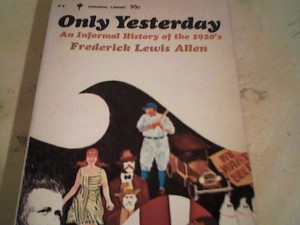
Breaking coverage of the Teapot Dome Scandal.
Before Frederick Lewis Allen became Editor-in-Chief of Harper’s in 1941, he published a pair of popular histories. The one I’m going to excerpt from is a 1933 tome called Only Yesterday: An Informal History of the 1920’s. It covers the zeitgeist from the end of WWI to the stock market crash of 1929. Pictured is a 1959 paperback version, which then cost 95 cents. (In 1940, Allen published a follow-up, Since Yesterday, which looked at the Great Depression.)
In this excerpt from Only Yesterday, the author describes the rebelliousness of the younger generation in 1920’s America, which sounds very much like an apt description of their grandchildren 40 years later. The passage is from a chapter titled “The Revolution in Manners and Morals”:
“A first-class revolt against the accepted American order was certainly taking place during those early years of the Post-war decade, but it was one with which Nikolai Lenin had nothing whatever to do. The shock troops of the rebellion were not alien agitators, but the sons and daughters of well-to-do American families, who knew little of Bolshevism and cared distinctly less, and their defiance was expressed not in obscure radical publications or in soap-box speeches, but right across the family breakfast table into the horrified ears of conservative fathers and mothers. Men and women were still shivering at the Red Menace when they awoke to the no less alarming Problem of the Younger Generation, and realized that if the Constitution were not in danger, the moral code of the country certainly was.”
